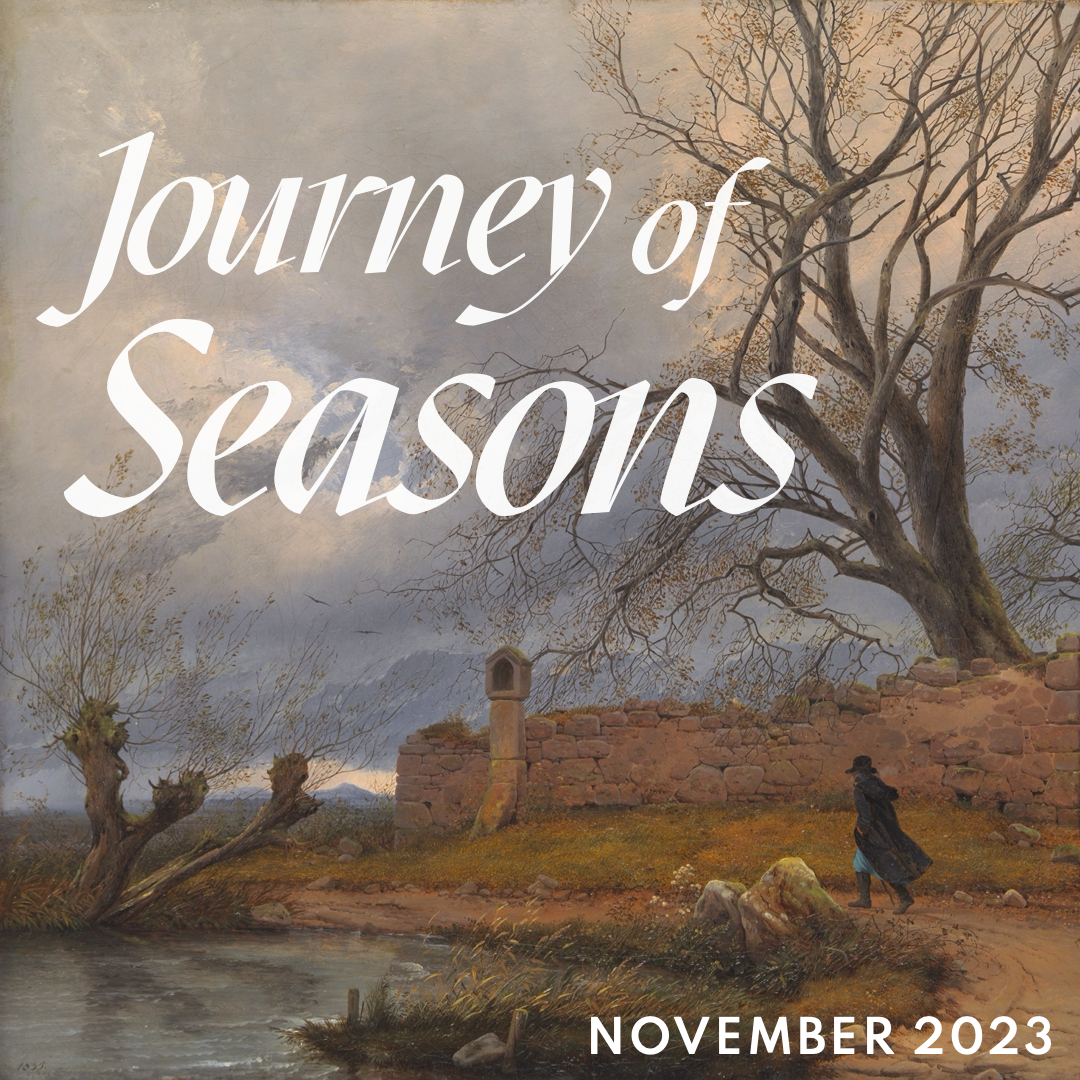|
Journey of Seasons
November 16 | Boston, MA November 18 | York, ME Tickets free of charge/suggested donation. Thursday, November 16, 7:00 pm David Friend Recital Hall, Berklee College of Music 921 Boylston St, Boston, MA MA Tickets Saturday, November 18, 1:00 pm York Public Library 15 Long Sands Rd, York, ME ME Tickets |
PROGRAM NOTES
Nightingale will perform the Massachusetts and Maine premieres of Andrew List's vocal quartet, clarinet, and piano cycle titled "Journey of Seasons." Featuring poetry by Queer, Belgian-American writer, May Sarton, "Journey of Seasons" uses the image of a garden as a metaphor for the self amidst life's seasons. In tandem with the performance, we will invite a modern poetry scholar to present on Sarton and her impact on 20th century American literature. This project is led by Nightingale Member Rose Hegele.
Introduction for “Journey of Seasons”, written by Dr. Ivy Schweitzer
May Sarton was, above all, an exile and outsider. Which is perhaps why her
prodigious literary output: 52 volumes of poetry, novels, and journals, is dominated
by the indefatigable drive to know the self and connect with others. Also why it is
imbued with a deep and abiding connection to nature. You will hear this in today’s
performance, in poems that feature Sarton’s exquisite depiction of the snow drops’
thrust, the healing power of trees, the aliveness of Shirley poppies. She was an avid
gardener and insisted on always having fresh flowers in her rooms. I think nature is
where this inveterate outsider could feel at home, rooted, if you will, accepted,
welcomed. For while nature is constantly growing, changing, dying and being
reborn, it is, nevertheless, always there for the exile to find beauty and refuge in.
Sarton’s outsider status also, perhaps, made it easier for her to be “liberated,” in the
words of Carolyn Heilbrun, a famous feminist critic, before the women’s
movement of the 1960’s made “liberated” a thing to be. That rather capacious term
seems perfect for characterizing someone who many people found irresistible, a
veritable life force and, in her darker moods, a hurricane leaving destruction in its
wake. Sarton never embraced the words we now use for women who loved women
and also men, sometimes at the same time, and often with reckless abandon and
astonishing frequency; for women who resisted marriage and chose to live alone
most of their lives; and for women who coveted the masculine privileges of
singularity and the strident burdens of the artist.
Born in Belgium in 1912 to a Belgian father and English mother, Sarton was forced
to leave her idyllic home when the Germans invaded during WW 1. The family
fled first to England and then to Cambridge, Massachusetts, where her father, a
historian of science, had an appointment at Harvard. Sarton was essentially a child
of war, always being fostered out to other families on account of forced relocation,
or poverty, or the sickliness of her mother and detachment of her father. She also
always felt caught between Europe and America. Although she planned to attend
Vassar College, she instead went to New York City to pursue a short-lived career in
the theater, all the time writing. There she published her first book of poetry in
1936 and her first novel in 1938; and just to show the extraordinary extent of her
work, she published her last book of poetry in 1994 and her last journal, titled At
Eighty in 1996, the year after her death.
That first novel, titled The Single Hound, was about an aspiring MALE poet, but
took its title from a startling image by another powerful female New Englander,
Emily Dickinson, in a poem that announces Sarton’s lifelong theme and obsession:
“Adventure most unto itself
The Soul condemned to be–
attended by a single hound–
Its own identity.”
In pursuit of this adventure of identity, Sarton was a pioneer. She was one of the
first writers to depict lesbian love in novels, as well as champion the beliefs of
Swiss psychologist Carl Jung that we are all androgynous—that is, we all contain
both masculine and feminine aspects in our soul, and our life’s goal is to bring
them both into full expression and balance. She was one of the first to explore with
unusual frankness her own complicated emotional history in her journals, including
her volatile personality (she threw tantrums!) and the challenges of aging. Very
importantly, she was one of the first to deplore the restrictions imposed on women
through marriage and motherhood. She believed that we should follow our hearts
without being bound by convention or shame. She was an unapologetic Romantic
in an age of ironic modernism. And for that, she was slow to be recognized by
critics and the academy but won a large and loyal readership.
Although friend and fellow poet Louise Bogan criticized Sarton for “keeping the
hell out of her poems,” for writing unabashed lyric and love poetry, Sarton broke
important ground for the great female confessional poets who came after
her—Sylvia Plath, Anne Sexton, even Adrienne Rich. Where they raged and often
came to grief, Sarton found a way to nourish her poet’s self —and us. In the poem,
“A Flower-Arranging Summer,” written around 1960, the speaker questions the
use of her morning time in this frivolous activity but concludes:
Within the floating world all is sensation
And yet I see eternity’s long wink
In these elusive games, and only there
When I can so suspend myself to think
I seem suspended in undying air.
Please join me in suspending and nourishing ourselves in Andrew List’s splendid
“Journey of Seasons,” sung by members the incomparable vocal ensemble,
Nightingale.
-Ivy Schweitzer
Nightingale will perform the Massachusetts and Maine premieres of Andrew List's vocal quartet, clarinet, and piano cycle titled "Journey of Seasons." Featuring poetry by Queer, Belgian-American writer, May Sarton, "Journey of Seasons" uses the image of a garden as a metaphor for the self amidst life's seasons. In tandem with the performance, we will invite a modern poetry scholar to present on Sarton and her impact on 20th century American literature. This project is led by Nightingale Member Rose Hegele.
Introduction for “Journey of Seasons”, written by Dr. Ivy Schweitzer
May Sarton was, above all, an exile and outsider. Which is perhaps why her
prodigious literary output: 52 volumes of poetry, novels, and journals, is dominated
by the indefatigable drive to know the self and connect with others. Also why it is
imbued with a deep and abiding connection to nature. You will hear this in today’s
performance, in poems that feature Sarton’s exquisite depiction of the snow drops’
thrust, the healing power of trees, the aliveness of Shirley poppies. She was an avid
gardener and insisted on always having fresh flowers in her rooms. I think nature is
where this inveterate outsider could feel at home, rooted, if you will, accepted,
welcomed. For while nature is constantly growing, changing, dying and being
reborn, it is, nevertheless, always there for the exile to find beauty and refuge in.
Sarton’s outsider status also, perhaps, made it easier for her to be “liberated,” in the
words of Carolyn Heilbrun, a famous feminist critic, before the women’s
movement of the 1960’s made “liberated” a thing to be. That rather capacious term
seems perfect for characterizing someone who many people found irresistible, a
veritable life force and, in her darker moods, a hurricane leaving destruction in its
wake. Sarton never embraced the words we now use for women who loved women
and also men, sometimes at the same time, and often with reckless abandon and
astonishing frequency; for women who resisted marriage and chose to live alone
most of their lives; and for women who coveted the masculine privileges of
singularity and the strident burdens of the artist.
Born in Belgium in 1912 to a Belgian father and English mother, Sarton was forced
to leave her idyllic home when the Germans invaded during WW 1. The family
fled first to England and then to Cambridge, Massachusetts, where her father, a
historian of science, had an appointment at Harvard. Sarton was essentially a child
of war, always being fostered out to other families on account of forced relocation,
or poverty, or the sickliness of her mother and detachment of her father. She also
always felt caught between Europe and America. Although she planned to attend
Vassar College, she instead went to New York City to pursue a short-lived career in
the theater, all the time writing. There she published her first book of poetry in
1936 and her first novel in 1938; and just to show the extraordinary extent of her
work, she published her last book of poetry in 1994 and her last journal, titled At
Eighty in 1996, the year after her death.
That first novel, titled The Single Hound, was about an aspiring MALE poet, but
took its title from a startling image by another powerful female New Englander,
Emily Dickinson, in a poem that announces Sarton’s lifelong theme and obsession:
“Adventure most unto itself
The Soul condemned to be–
attended by a single hound–
Its own identity.”
In pursuit of this adventure of identity, Sarton was a pioneer. She was one of the
first writers to depict lesbian love in novels, as well as champion the beliefs of
Swiss psychologist Carl Jung that we are all androgynous—that is, we all contain
both masculine and feminine aspects in our soul, and our life’s goal is to bring
them both into full expression and balance. She was one of the first to explore with
unusual frankness her own complicated emotional history in her journals, including
her volatile personality (she threw tantrums!) and the challenges of aging. Very
importantly, she was one of the first to deplore the restrictions imposed on women
through marriage and motherhood. She believed that we should follow our hearts
without being bound by convention or shame. She was an unapologetic Romantic
in an age of ironic modernism. And for that, she was slow to be recognized by
critics and the academy but won a large and loyal readership.
Although friend and fellow poet Louise Bogan criticized Sarton for “keeping the
hell out of her poems,” for writing unabashed lyric and love poetry, Sarton broke
important ground for the great female confessional poets who came after
her—Sylvia Plath, Anne Sexton, even Adrienne Rich. Where they raged and often
came to grief, Sarton found a way to nourish her poet’s self —and us. In the poem,
“A Flower-Arranging Summer,” written around 1960, the speaker questions the
use of her morning time in this frivolous activity but concludes:
Within the floating world all is sensation
And yet I see eternity’s long wink
In these elusive games, and only there
When I can so suspend myself to think
I seem suspended in undying air.
Please join me in suspending and nourishing ourselves in Andrew List’s splendid
“Journey of Seasons,” sung by members the incomparable vocal ensemble,
Nightingale.
-Ivy Schweitzer




